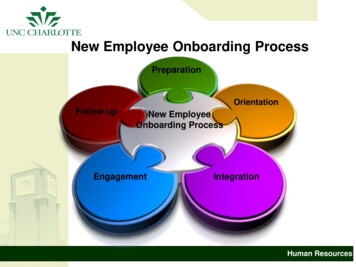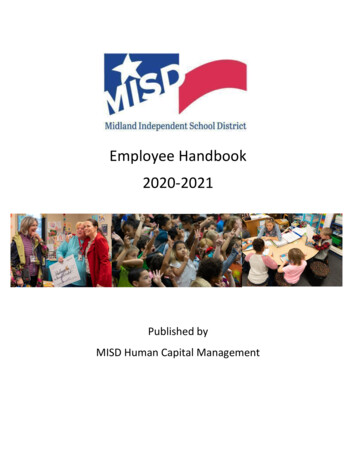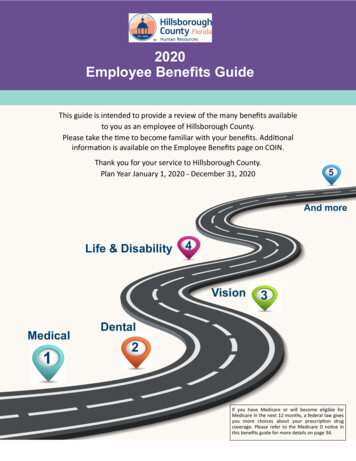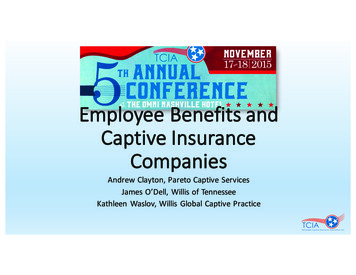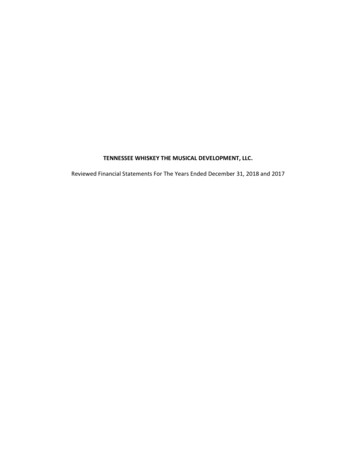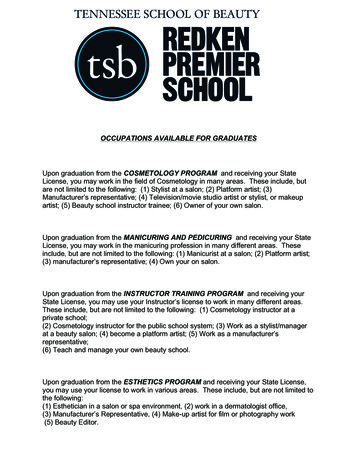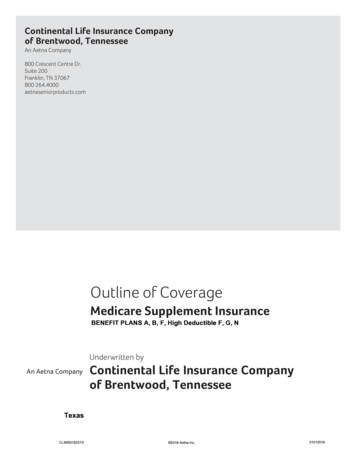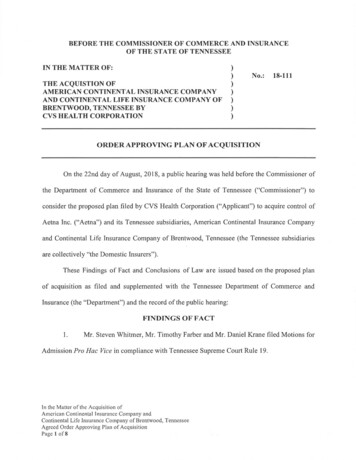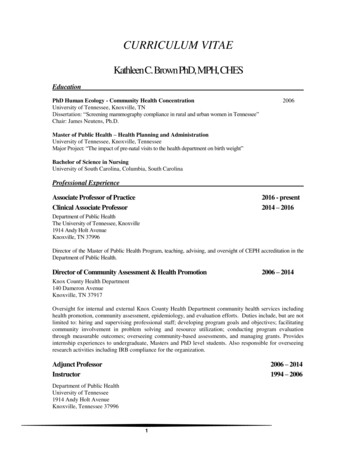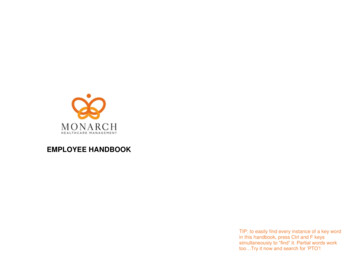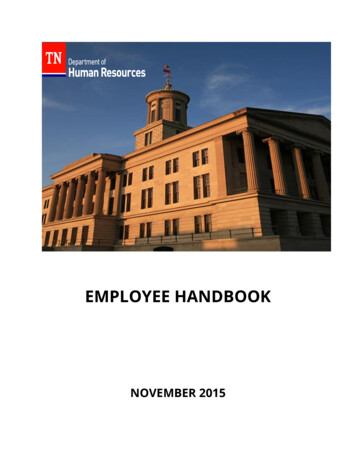
Transcription
EMPLOYEE HANDBOOKNOVEMBER 2015
STATE OF TENNESSEEEMPLOYEE HANDBOOKTable of ContentsIntroductionIntroduction . 1State Organizational Chart . 2Management’s Role. 3Successful Onboarding . 4The Employee’s Role . 5CompensationPay Periods . 6Direct Deposit . 6Deductions . 6Longevity . 7Overtime . 7Compensatory Time. 8Prior Service .9Employee BenefitsInsurance .10Deferred Compensation .10Sick Leave Bank .11Donated Leave 12Service Awards 12Employee Suggestion AwardProgram 13Tennessee EmployeesCharitable Campaign .13Learning and Development 13Parking .13Fee Waiver/Fee Discounts .13Attendance and LeaveHours of Work .15Absenteeism . 15Lunch Hour 15Rest Breaks 16Wellness Break .16Holidays .16Leave Accrual .17Employees Eligible to AccrueLeave . 17Employees Ineligible toAccrue Leave 17Annual Leave . 18Sick Leave . 19Leave for Adoption, Pregnancy,Childbirth, and Infant Nursing . 20Family Leave . 21Adoptive Leave . 22Family Medical Leave Act . 22Civil Leave. 22Military Leave . 22Bereavement Leave . 23Discretionary Leave with Pay . 23Special Leave – StateAssessments and Interviews . 23Elections . 23Inclement Weather . 24Disaster Leave . 24General Personnel Practices &Administrative GuidelinesEqual EmploymentOpportunities . 25Performance Management . 26Probationary Periods . 27Promotions/Transfers . 28Public Relations - Conflict of
Interest .28Political Activity .29Personnel Records .29Employee Identification .30Equipment & Supplies .30Telephone Use .30Computer Use .31Solicitation .31Gifts and Contributions .31Personal Property .31Dress and Grooming .32Conduct. 36Disciplinary Action . 38Oral Warning . 38Written Warning . 38Suspension Without Pay . 39Dismissal . 39Transfer or Demotion . 39Appeals . 39Mediation . 40Fraud, Waste and Abuse. 40SeparationsHealth and SafetyWorkers’ Comp/Accidents/Injured in the Line of Duty .33ParTNers Health & WellnessCenter .33ParTNers for Health WellnessProgram.34ParTNers Employee AssistanceProgram (EAP) .34Drug-Free Workplace .35Smoking Policy .35Employee ConductWork Performance andResignation . 41Dismissal . 41Job Abandonment . 41Return of State Property . 41AppendixEmployee HumanResource Policies. Attachment 1Employee PolicyAcknowledgment Attachment 2New EmployeeChecklist Attachment 3
IntroductionThis manual has been designed to outline and summarize basic personnel policies,employee benefits, employee responsibility and general personnel practices. Thishandbook is intended for all employees in the state service.This handbook was developed to provide general guidelines about the State’s policies andprocedures for employees; however, this handbook is not intended to state contractualterms and does not constitute a contract between the State of Tennessee and itsemployees, applicants for employment, or parties who do business with the State ofTennessee. This document is also not a complete review of policies and procedures thatregulate the all human resources actions in state government.For additional information regarding the Rules of the Tennessee Department of HumanResources, please contact your agency’s human resources office or see the Rules or thepolicies, which are posted on the website for the Department of Human Resources.1
2
Management’s RoleOn the first day of employment, the immediate supervisor, human resources office, orother designee (representative) should discuss, at a minimum, the following topics with theemployee:1.Working hours;2.Breaks and lunch periods;3.Location of facilities;a. Restroomsb. Lunch and break areas4.Health and safety considerations;a.b.c.d.e.f.Physical safety proceduresFire escapesExits (layout of building)Procedures for fire drillsLocation of first aid kitsProcedures for reporting fires, bomb threats, or other emergencies. Asmall card listing emergency numbers and other critical data that theemployee can affix to the desk or work surface is helpful.5.Paydays and the method of payment;6.Location of the work area, if unclear in the job context;7.Information on when,where,orientation/onboarding is conducted;8.Leave accrual, use of leave, and reporting time;9.Reporting absences and requesting leave, including specific notificationprocedures and contact information in case of illness, tardiness, etc;andhow10.Information on parking, bus stops, car pooling, etc.;11.Operation of the phone system;formala. How to answer the phone in that particular work area3organizational
b.c.d.e.How to transfer callsHow to set up and utilize voice mail, if applicableRules for receiving and making personal callsHow to be reached in case of an emergency12.Procedures for obtaining supplies and other equipment;13.Basic security requirements and procedures for handling confidential materialand/or information so that the employee does not incur a violation; and14.Dress code and behavior specific to the department or office.Within the first week of employment, the immediate supervisor, human resources office, orother designee (representative) should discuss with the employee the New EmployeeChecklist (Attachment 1). The representative should ensure that the employee is givenadequate time to gain a clear understanding of the information and ask questions. Whencomplete, the representative shall place the signed document in the employee’s personnelfile.Also, the representative should discuss key procedures, make introductions to co-workers,and offer some basic on-the-job training. In some organizations, a physical walk-throughhelps give the employee an overall framework of the organization. Having names, phonenumbers, and other critical information, typed on a card for the employee is also helpful.Successful On-boardingIn addition to going over the basic information outlined in the attached New EmployeeChecklist, a complete orientation will require that you share department specificinformation with the new employee, which might include an organizational chart, a briefoverview of the department, the department’s mission and vision statement and an officetelephone directory.Provide all written material (booklets for insurance, retirement,flexible benefits, deferred compensation, etc.) and/or electronic links at this time and makethe employee aware of all required timeframes for completing the enrollment process forthe various benefits.Have a follow up meeting the second week of employment to answer questions andcomplete any required paperwork. A thirty (30) day follow up meeting is recommended tohelp identify and resolve any areas of concern for the employee or the supervisor.4
The Department of Human Resources developed the Employee Handbook to serve as aguide during the employee’s orientation/onboarding period. The immediate supervisor,human resources office, or other designee may use this handbook to guide discussions ontopics ranging from the employee’s compensation, benefits, and state employmentpractices to health and safety information. In addition, the handbook provides informationpertaining to management’s expectations for an employee’s conduct, including informationon the disciplinary process and the appeal procedures. The information in this handbookserves as an effective reference manual throughout the employee’s career with stategovernment.The Employee’s RoleThis handbook provides some basic information about state employment. This handbookcan be found online on the website for the Department of Human Resources.The orientation/onboarding handbook contains a “New Employee Checklist” that serves asa road map for orientation/onboarding discussions with your supervisor and other keyemployees within your organization. As you complete each discussion, initial the topic toindicate your understanding of the information provided.This handbook provides specific program criteria and other general information regardingbenefits, programs, etc., with the relevant web addresses provided for more informationon various topics.If you encounter any orientation topics or areas of concern notaddressed in this handbook, or if you have any further questions, please contact youragency’s human resources office.5
COMPENSATIONPay PeriodsPaydays occur twice monthly and fall on or about the middle and last day of the month.You will receive your pay by direct deposit to your account. Your paycheck information isavailable for viewing on-line through Edison. The paycheck information shows payment forthe previous work period rather than the period just completed. If a payday falls on aweekend or a holiday, you are paid on the nearest working day in advance of that date.Direct DepositDirect deposit is a requirement of employment, unless otherwise exempted by theDepartments of Human Resources and Finance and Administration. With direct deposit,your pay is automatically deposited into your account in any financial institution that is amember of the Federal Reserve Network. You may view paycheck information, includingan itemized statement of gross pay, deductions, net pay, and other items, on-line throughEdison. If ESS (Employee Self-Service) is used in Edison, the direct deposit information isimmediately received. However, if ESS is not used, it may take up to two (2) pay periods toset up direct deposit; until such time, a paper check is mailed to your home address. Foradditional information about direct deposit, consult your human resources/payroll office.DeductionsSome deductions from your pay are mandatory, while others are voluntary. Mandatorydeductions include federal income tax (withholding) and social security contributions(FICA). The amount of federal income tax withheld from your gross earnings dependsupon your salary and how many dependents you choose to claim each year. FICA isdeducted from your gross salary at a fixed rate.Voluntary deductions requiring your authorization include your health, dental, accident andlife insurance premiums, deferred compensation, donations to the Tennessee EmployeesCharitable Campaign, flexible benefits, and other state approved special deductions. Yourdeductions for insurance premiums are determined by the coverage you select.Theamount of other deductions depends upon the commitment you wish to make.The paycheck information, which may be found in Edison, includes an itemized statementof gross pay, various deductions, net pay, and other items of importance. You may alsoview information in Edison related to annual, sick, and compensatory leave balances and6
your Sick Leave Bank membership status. Edison stores up to eighteen (18) months ofpaycheck information and you may print copies of this information as needed for officialrecords for income tax or other purposes.LongevityLongevity is a lump sum payment, intended to reward employees for service to the stateand to encourage employees to remain employed by the state. All full-time employeesemployed for 36 months or more with one or more agencies, departments, offices, orother subdivisions of the executive, judicial, or legislative branches of state government areeligible for longevity pay if hired on or before June 30, 2015. Employees become eligible forlongevity at the completion of 36 months of creditable state employment. Under certainconditions, part-time employees may be eligible to receive longevity. Employees hired afterJune 30, 2015 are not eligible to receive longevity.Longevity is paid, in conjunction with your regular salary, on the payday at the end of themonth following the completion of a creditable year of state employment, whichconstitutes the employee's longevity anniversary date.Employees on paid leave areeligible to receive the payment on their longevity anniversary date.Within the stateservice, active full-time service, Division of Claims Administration time, paid educationalleave, and authorized unpaid military leave are creditable toward longevity. Other types ofspecial leave without pay and leave received from the Sick Leave Bank are not creditabletoward longevity.Full-time employees with prior part-time service consisting of at least a 1600-hour annualschedule shall receive longevity credit for each month of such part-time service in whichthey were scheduled to work a full month and actually worked one-tenth of one hour morethan half of the regularly scheduled work hours.OvertimeAdditional compensation may be paid to certain state employees who work in excess ofregularly scheduled hours. Approval to work overtime must be at the direction of theappropriate manager/supervisor. Certain classifications are entitled to additionalcompensation for work in excess of regular scheduled hours, as follows:(1) Non-Exempt PersonnelEmployees who are subject to the overtime requirement of the Fair Labor StandardsAct (FLSA) are eligible to be compensated in cash for approved time actually worked7
in excess of their regular schedule for a workweek, i.e., the employee may requestcompensatory time instead of cash.(2) Exempt PersonnelEmployees who are exempt from the overtime pay requirements of the Fair LaborStandards Act (FLSA) may be compensated for approved overtime worked withcompensatory leave, i.e., time off instead of cash.(3) ExceptionsExceptions to this policy must be recommended by the appointing authority andapproved in advance by the Commissioners of the Department of HumanResources and the Department of Finance and Administration. Such recommendedexceptions must be consistent with state and federal law.(4) Executive Level PersonnelExecutive level employees as defined by the Rules of the Department of HumanResources are not eligible to receive compensation for hours worked beyond theirregular schedule.Compensatory TimeCompensatory time is leave credit earned by an exempt or non-exempt employee whencompensable overtime hours are worked and are not compensated in cash.Compensatory time is accrued on a workweek basis. Compensatory time may be accruedup to a maximum balance of 480 hours overtime. Any compensatory time accrued inexcess of 480 total hours or 240 hours of premium compensatory time will be paid in cash.Use of Compensatory Time: The use of compensatory time is subject to the approvalof the appointing authority or a designated manager/supervisor in the same manneras annual leave. When an employee requests annual leave and compensatory leaveis available, the compensatory leave shall be used first, unless the accumulatedannual leave balance at the beginning of the pay period is within two (2) days of themaximum accrual rate for the employee’s service group code. If the employee iswithin the two (2) day maximum accrual rate annual leave may be used until the pointthe employee falls below the two (2) day maximum, at this point the employee mustbegin using compensatory leave.8
Transferability of Compensatory Time: Compensatory time is transferable betweenexecutive branch agencies of state service. Compensatory time earned is taken priorto the beginning of terminal leave, taken prior to separation if the employee has noterminal leave, or paid in a lump sum at separation at the discretion of the appointingauthority.Holiday Compensatory Time: Employees in certain agencies are not able to observeofficial state holidays due to the nature of their responsibilities. An employee who isscheduled to work on a holiday will receive compensatory overtime on an hour-forhour basis for time actually worked up to the number of hours scheduled on the dayof the holiday.Prior ServicePrior service may affect your annual leave and/or sick leave accumulation. Ensure that theTennessee Consolidated Retirement System (TCRS) staff and your departmental humanresources office are aware of your specific state or other related service.Employees may purchase prior service by paying the amount withdrawn plus interestcompounded annually from the date of refund. There are several options available topurchase prior service. Please contact TCRS for your specific information regarding thisoption or go to their website at http://www.treasury.state.tn.us .9
EMPLOYEE BENEFITSInsuranceThe State of Tennessee offers eligible employees a basic package of group health, term life,and accident insurance. Optional dental, term and universal life and accident coverage arealso available.Employees pay 20 percent of their insurance premium for the basic package; the statecontributes the remaining 80 percent. Employees pay the full premium for any optionalcoverage(s). Health insurance is available through a choice of providers, based on yourcounty of residence or work.Please review the following materials about your insurance options: Summary of Your Insurance BenefitsMedical/Dental Plan ComparisonOptional Life BrochureIndividual vendor materialsState group insurance is administered by the Department of Finance and Administration’sDivision of Benefits Administration.Additional information regarding state groupinsurance options is available on the website for the Department of Finance andAdministration http://www.tn.gov/finance/ .Retirement from state service offers excellent benefits.Full-time employees areautomatically members of the Tennessee Consolidated Retirement System. Contributionsmade by the State ensure an income during retirement years. Additional informationregarding retirement benefits may be obtained from your human resources office or fromthe Tennessee Consolidated Retirement System.Deferred Compensation (401(k) and 457)Employees of the State of Tennessee are eligible to participate in two optional tax-deferredretirement savings plans operated by the state: a 457 plan and a 401(k) plan. Contributionsto these plans are made through regular payroll deductions. Except under a few limitedcircumstances, salary set aside through these plans cannot be withdrawn before reachingage 59½ or separation from state service. Participants in either plan are permitted to directtheir contributions among a variety of investment options.10
The State will match an employee deferral 100 percent up to a 50.00 contribution by theemployee. The minimum contribution is 20.00. The State match amount is subject toannual appropriation. The maximum amount of the employee deferral to each plan set bythe IRS is currently the lower of 100 percent of salary or 16,500.00. In general, stateemployees who participate in the 401(k) plan and who are eligible to participate in theTennessee Consolidated Retirement System will be eligible to receive the match.Continuation of the match in future years is subject to funding in the state's annualappropriation. For additional information about the Deferred Compensation plan go to theTreasury Department’s website http://treasury.state.tn.us .Employees hired on or after July 1, 2014 will participate in a hybrid pension plan, which is acombination of a defined benefit plan and a defined contribution plan. The definedcontribution funds will be deposited into the state’s 401(k) plan, where the employee willmanage the investments within the program.Sick Leave BankThe Sick Leave Bank grants paid sick leave to members who are medically certified asunable to perform the duties of their jobs as a result of a personal illness, injury, accident,disability, medical condition, or quarantine and who have exhausted all their personal sick,compensatory and annual leave balances. The member employee must meet the criteriaestablished by the Sick Leave Bank and have been in a without pay status for five (5)consecutive days.The enrollment period is August, September and October each year.To elect toparticipate, an employee must:A. be eligible to accrue sick leave pursuant to Tenn. Code Ann. § 8-50-802;B. have been employed by state government for twelve (12) full months immediatelypreceding application for participation;C. currently accrue leave; andD. have a sick leave balance of at least six (6) days as of October 31 of the currentenrollment year in which applying for membership.At the time of enrollment, the member employee will have the equivalent of four (4) daysof sick leave deducted from the employee’s personal accumulation and donated to the sickleave bank. An annual contribution of one (1) sick leave day every October 1 after the first11
year of enrollment is required, although this may be waived by the Board of Trustees in anyyear.A member of the Sick Bank shall be eligible to make application to the bank for sick leaveon February 1 following enrollment. Applications for grants from the bank for pre-existingconditions will be denied until November 1 of the following year.Grants of sick leave from the bank will be denied to any member for the following:A.B.C.D.elective surgery;illness of any member of the participant's family;while the member is earning or receiving income from other employment;during any period the member is receiving disability benefits from socialsecurity, or the state retirement plan; orE. the member is receiving workers’ compensation benefits, or any other employerprovided benefits for job or service related injuries or illnesses.Grants can be made in increments of up to thirty (30) consecutive workdays not to exceedthe ninety (90) day maximum for any one personal illness, injury, accident, disability,medical condition, or quarantine, or a condition related to, resulting from, or recurringfrom a previously diagnosed condition for which the bank granted sick leave.Sick leave used from the bank will not constitute creditable service for sick and annualleave accrual or for longevity purposes. An employee using sick leave from the bank is noteligible for holiday pay. An employee receiving grants of sick leave from the bank will bepaid holiday pay as one of the regularly approved sick leave bank days.Donation of Sick Leave between State EmployeesEmployees may donate a portion of their sick leave to eligible Sick Leave Bank memberswho have exhausted all of their own sick, annual, and compensatory leave and all benefitsavailable through the Sick Leave Bank. Contact your human resources office for moreinformation on donated leave.Service AwardsThe State of Tennessee’s Service Awards Program recognizes employees for their service tostate government. Service awards are presented beginning with five years of creditableservice and at each increment of five (5) years thereafter. Beginning at thirty (30) years ofservice and above, employees receive a personalized plaque in addition to the award theyselect.12
Employee Suggestion Award Program (ESAP)Employees are eligible for either cash or honorary awards under the Employee SuggestionAward Program. Cash awards are given for adopted suggestions that result in substantialsavings or improvements in state operations. The maximum cash award is ten (10) percentof the first year’s estimated savings, or ten thousand dollars ( 10,000), whichever is less.However, the ESAP Board may increase the maximum amount of an award for a suggestionthat results in extraordinary monetary savings for the state. The ESAP Coordinator for youragency facilitates the evaluation of suggestions and distribution of information about theprogram. You may obtain an ESAP Suggestion Form from your agency human resourcesoffice or it is available online on the website for the Department of Human Resources.Tennessee Employees Charitable CampaignEach year, employees are given an opportunity to participate in supporting worthycharitable efforts within the community. The Tennessee Employees Charitable Campaign(TECC) is the only charity drive conducted by state government. Participation is strictlyvoluntary. Contributions must be designated to a specific agency and are made by payrolldeduction. Information regarding the TECC is available on the website for the Departmentof Human Resources.Learning and DevelopmentThe Strategic Learning Solutions (SLS) Division within the Department of Human Resourcessupports agencies in building and sustaining high-performing organizations that learn andevolve by providing a full range of products and services in Leadership Development,Talent Management, Performance Management and Professional Skills. The SLS websitecan be accessed through the website for the Department of Human Resources andprovides access to information about available courses and enrollment instructions.ParkingParking options vary depending on your office location. See your agency’s humanresources office or supervisor for additional information.Fee Waiver and Fee Discount ProgramsTwo programs are available to facilitate postsecondary educational opportunities for Stateemployees and their dependents, as well as dependents of public school teachers: the feewaiver program for State employees and the fee discount program for children of Stateemployees and public school teachers.13
The fee waiver program allows full-time employees of the executive, judicial, or legislativebranch of state government to take one course, undergraduate or graduate, at any Statesupported college, university or technology center, as well as the Tennessee ForeignLanguage Institute. An employee may receive the waiver for only one course per semesteror mini-semester, not to exceed a maximum of four (4) courses per academic year.The fee discount program provides a 25 percent discount on enrollment fees forundergraduate courses, generally referred to as tuition, to the child of a full-time employeeof the executive, judicial, or legislative branch of state government. The child must beunder the age of twenty-four (24) as of the first day of classes and live with, or previouslylived in a parent-child relationship with, the eligible employee or teacher. The discount isapplied to any number of courses, up to and including full-time study.information on these programs is available at www.tn.gov/thec .14Additional
ATTENDANCE AND LEAVEHours of WorkThe regular schedule for most employees is 8:00 a.m. to 4:30 p.m., Monday through Friday.Local conditions may cause these hours to vary, but an employee scheduled to work sevenand one half (7.5) hours per day, Monday through Friday, is considered to be on a regularwork schedule. Any agency may use irregular work schedules and vary its work hours andworkdays at the discretion of the appointing authority. Any full-time schedules other thanthirty seven and one half (37.5) hours per week must be approved in advance by theCommissioner of Human Resources and the Commissioner of Finance and Administration.AbsenteeismIf you must be late for work or absent because of illness or for an unforeseencircumstance, personally notify your appropriate manager or immediate supervisor assoon as possible by telephone. Supervisors may designate a specific call-in time.When you have to be late or absent, it is important that you give your supervisor maximumadvance notice so that replacement arrangements or work assignments can be made.Your supervisor will cooperate with you on these occasions if you will personally give asmuch advance notification as possible. However, excessive absenteeism is inappropriate.Remember that supervisors must account for and approve all employee absences.Lunch HourAll employees, except those listed below, shall be allowed a one (1) hour unpaid mealperiod. The authorized meal period must be taken during the work shift and may not beused to alter arrival or departure time by not using the meal period. Uniformed members of the Department of SafetyWildlife OfficersPark RangersAll employees assigned to hospitals or institutions in the Departments of MentalHealth, Intellectual and Developmental Disabilities, Correction, and Children’sServices15
Rest BreaksAppointing authorities or agency heads, at their discretion, may allow their employees two(2) rest breaks during each workday. One break may be allowed in the morning and theother in the afternoon for a period not to exceed fifteen (15) minutes each. These restbreaks are a privilege and not a right and should be taken at times that do not interferewith service to the public. If an employee chooses not to take advantage of rest breaks,this time may not be accumulated and added to lunch periods or any type of leave. A restbreak may not be used to alte
regulate the all human resources actions in state government. For additional information regarding the Rules of the Tennessee Department of Human Resources, please contact your agency’s human resources office or see the Rules or the policies, which are posted on the websit
